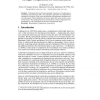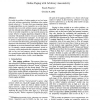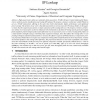100
click to vote
JLP
2010
14 years 8 months ago
2010
Abstract. Noting that the usual `propositionally' based way of composing retrenchments can yield many `junk' cases, alternative approaches to composition are introduced (...
110
click to vote
MICRO
2010
IEEE
14 years 12 months ago
2010
IEEE
The ever-increasing importance of main memory latency and bandwidth is pushing CMPs towards caches with higher capacity and associativity. Associativity is typically improved by in...
109
click to vote
APAL
2010
15 years 2 months ago
2010
Abstract. We develop a general algebraic and proof-theoretic study of substructural logics that may lack associativity, along with other structural rules. Our study extends existin...
101
click to vote
SODA
2003
ACM
15 years 3 months ago
2003
ACM
We tackle the problem of online paging on two level memories with arbitrary associativity (including victim caches, skewed caches etc.). We show that some important classes of pag...
147
click to vote
MICRO
2003
IEEE
15 years 7 months ago
2003
IEEE
Abstract—High-speed routers often use commodity, fully-associative, TCAMs (Ternary Content Addressable Memories) to perform packet classification and routing (IP lookup). We prop...
144
click to vote
INFOCOM
2005
IEEE
15 years 7 months ago
2005
IEEE
—IP-Lookup is a challenging problem because of the increasing routing table sizes, increased traffic, and higher speed links. These characteristics lead to the prevalence of hard...



